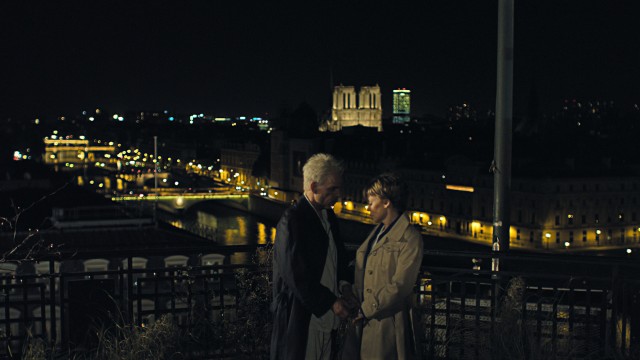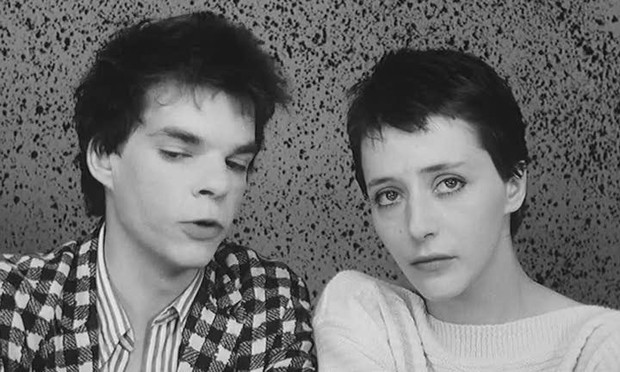THE DECENT ONE (DER ANSTÄNDIGE) (Vanessa Lapa, 2014)
Film Forum
209 West Houston St.
October 1-14, 12:30, 2:40, 4:50, 7:00, and 9:15
212-727-8110
www.filmforum.org
 Vanessa Lapa’s chilling feature documentary debut, The Decent One, reveals that there wasn’t a whole lot that was decent about Heinrich Himmler, the SS chief who was the architect of the Final Solution. In 2006, Lapa’s father purchased a collection of Himmler’s diaries, letters, documents, and photographs that had initially been discovered in his home by U.S. soldiers in May 1945. The treasure trove forms the narration for Lapa’s film, as actors read from many of the items in chronological order while home movies, still images, and rare archival footage of Himmler and the rise of the SS are shown onscreen. The film includes letters, postcards, and diaries from Himmler; his parents; his wife, Marga; his mistress, Hedwig Potthast; his beloved daughter, “Püppi”; his foster son, Gerhard von Ahé; and others, in which the Gestapo head discusses love and romance, racial purity, motherhood, duty and honor, order and obedience, the Jewish question, homosexuality, and subhumans, troubling views he developed from a young age. “People don’t like me,” he writes after not being accepted into a fraternal group at college. Looking for purpose in his life, he explains, “You start to think, if only there was a war again. If only I could put my life on the line. Fight! It would be a pleasure.” He was also fully aware of the brutality of the Nazi regime. “I can predict the horrors of the future,” he notes in 1927.
Vanessa Lapa’s chilling feature documentary debut, The Decent One, reveals that there wasn’t a whole lot that was decent about Heinrich Himmler, the SS chief who was the architect of the Final Solution. In 2006, Lapa’s father purchased a collection of Himmler’s diaries, letters, documents, and photographs that had initially been discovered in his home by U.S. soldiers in May 1945. The treasure trove forms the narration for Lapa’s film, as actors read from many of the items in chronological order while home movies, still images, and rare archival footage of Himmler and the rise of the SS are shown onscreen. The film includes letters, postcards, and diaries from Himmler; his parents; his wife, Marga; his mistress, Hedwig Potthast; his beloved daughter, “Püppi”; his foster son, Gerhard von Ahé; and others, in which the Gestapo head discusses love and romance, racial purity, motherhood, duty and honor, order and obedience, the Jewish question, homosexuality, and subhumans, troubling views he developed from a young age. “People don’t like me,” he writes after not being accepted into a fraternal group at college. Looking for purpose in his life, he explains, “You start to think, if only there was a war again. If only I could put my life on the line. Fight! It would be a pleasure.” He was also fully aware of the brutality of the Nazi regime. “I can predict the horrors of the future,” he notes in 1927.
Even his love letters evoke the terror he brought to the world. “What a naughty man you have, with such an evil, naughty movement,” he writes to his wife. Lapa and editors Sharon Brook and Noam Amit move smoothly between pictures of Himmler with his wife and children and shots of him in uniform, inspecting the troops and meeting with Adolf Hitler. It all makes for an uncomfortable intimacy, especially when the actual letters fill the screen; seeing his handwriting while listening to his words is extremely disturbing, but it’s not done in an effort to humanize him, as there is not much humanity to be found in the mass murderer responsible for so many atrocities. The Decent One is disquieting and unnerving, but it is also essential viewing. Named Best Documentary at the Jerusalem Film Festival, The Decent One begins a two-week run at Film Forum on October 1 (perhaps not coincidentally during the Days of Awe, the ten days of contemplation and repentance between Rosh Hashanah and Yom Kippur); Lapa will participate in Q&As following the 7:00 screenings October 1, 2, and 4.
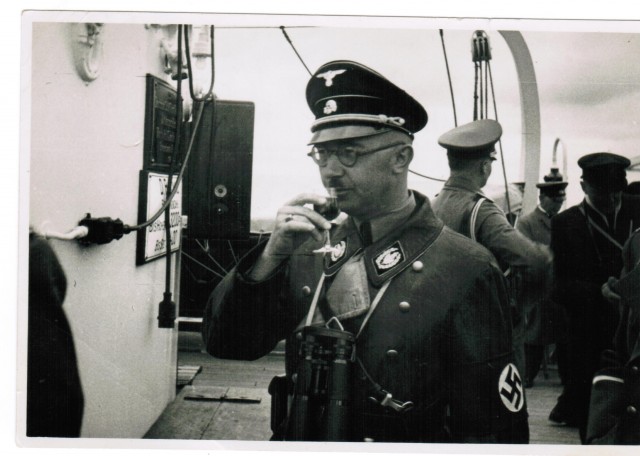
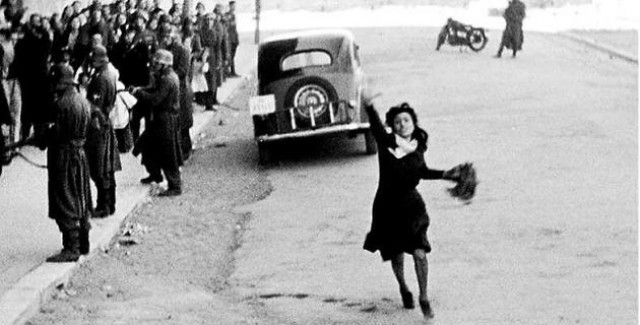
 One of six films to be awarded the Grand Prix at the inaugural Cannes Film Festival in 1946, Roberto Rossellini’s Rome Open City is an antiwar masterpiece, the first of three works that together form his War Trilogy, along with Paisan and Germany Year Zero. Begun in January 1945 with Italy still under German occupation, Rome Open City melds neorealism with melodrama in telling the story of a small, tight-knit community secretly battling the Nazis. The leader of the local Italian resistance is Giorgio Manfredi (Marcello Pagliero), an engineer sending messages and money through courier Don Pietro (Aldo Fabrizi), a priest who is generally left alone by the Nazis and the Italian police. Giorgio hides away in his friend Francesco’s (Francesco Grandjacquet) apartment as Francesco prepares to marry Pina (Anna Magnani), a pregnant widow raising a son, Marcello (Vito Annicchiarico), who is part of a gang of young kids also fighting in the resistance and causing a surprising amount of trouble. Meanwhile, Giorgio’s former flame, cabaret performer Marina Mari (Maria Michi), is cozying up to Ingrid (Giovanna Galletti), a suspicious woman with ties to the Nazis, who are led by the relentless Major Bergmann (Harry Feist). With events coming to a head, faith is questioned, and betrayals set in motion violence, torture, and killings that brutally characterize the many horrors of war. Written by Sergio Amidei and Federico Fellini, Rome Open City is a remarkable example of guerrilla filmmaking, with Rossellini and cinematographer Ubaldo Arata shooting on the streets of Rome using whatever dupe negatives they could get their hands on. The mix of professional and nonprofessional actors lends a stark reality to the proceedings. “Above all, the concept was to give an honest account, to show things as they were,” Rossellini explained in a 1963 intro to the film, a staggering achievement that seems to only get better with age. Rome Open City is screening September 12-25 in a new 35mm restoration at Film Forum.
One of six films to be awarded the Grand Prix at the inaugural Cannes Film Festival in 1946, Roberto Rossellini’s Rome Open City is an antiwar masterpiece, the first of three works that together form his War Trilogy, along with Paisan and Germany Year Zero. Begun in January 1945 with Italy still under German occupation, Rome Open City melds neorealism with melodrama in telling the story of a small, tight-knit community secretly battling the Nazis. The leader of the local Italian resistance is Giorgio Manfredi (Marcello Pagliero), an engineer sending messages and money through courier Don Pietro (Aldo Fabrizi), a priest who is generally left alone by the Nazis and the Italian police. Giorgio hides away in his friend Francesco’s (Francesco Grandjacquet) apartment as Francesco prepares to marry Pina (Anna Magnani), a pregnant widow raising a son, Marcello (Vito Annicchiarico), who is part of a gang of young kids also fighting in the resistance and causing a surprising amount of trouble. Meanwhile, Giorgio’s former flame, cabaret performer Marina Mari (Maria Michi), is cozying up to Ingrid (Giovanna Galletti), a suspicious woman with ties to the Nazis, who are led by the relentless Major Bergmann (Harry Feist). With events coming to a head, faith is questioned, and betrayals set in motion violence, torture, and killings that brutally characterize the many horrors of war. Written by Sergio Amidei and Federico Fellini, Rome Open City is a remarkable example of guerrilla filmmaking, with Rossellini and cinematographer Ubaldo Arata shooting on the streets of Rome using whatever dupe negatives they could get their hands on. The mix of professional and nonprofessional actors lends a stark reality to the proceedings. “Above all, the concept was to give an honest account, to show things as they were,” Rossellini explained in a 1963 intro to the film, a staggering achievement that seems to only get better with age. Rome Open City is screening September 12-25 in a new 35mm restoration at Film Forum.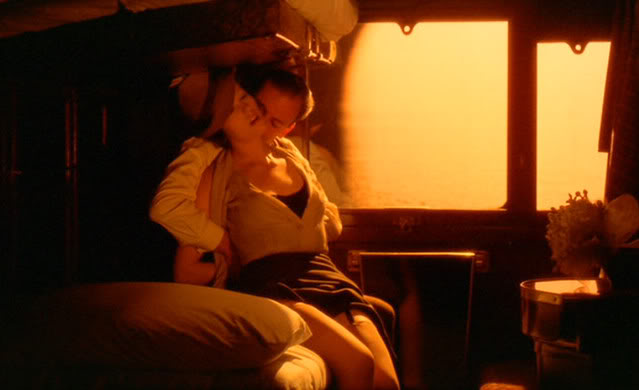
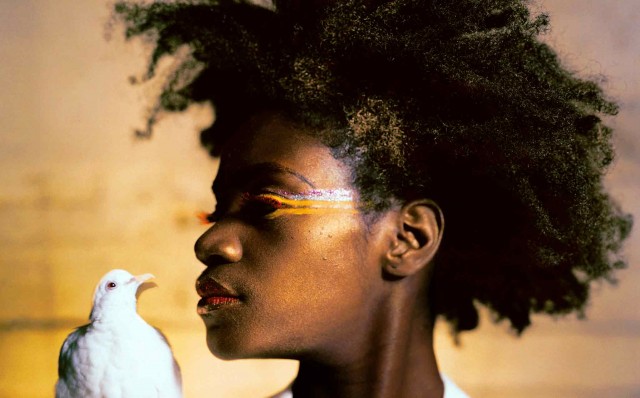
 Thomas Allen Harris exposes the conflicting relationship between the public and private visual depiction of African Americans in the powerful, if overly idealistic and methodical, Through a Lens Darkly: Black Photographers and the Emergence of a People. Inspired by Deborah Willis’s 2000 book, Reflections in Black: A History of Black Photographers 1840 to the Present, the documentary examines how black men, women, and children have been portrayed in advertising and the media and on postcards since the development of the camera and daguerreotypes, depicting them in negative, stereotyped ways as animals, criminals, and, most horrifically, victims of lynchings. Over the course of seven years, the Bronx-born Harris interviewed such photographers and scholars as Carrie Mae Weems, Glenn Ligon, Lorna Simpson, Dawoud Bey, Coco Fusco, Chuck Stewart, and
Thomas Allen Harris exposes the conflicting relationship between the public and private visual depiction of African Americans in the powerful, if overly idealistic and methodical, Through a Lens Darkly: Black Photographers and the Emergence of a People. Inspired by Deborah Willis’s 2000 book, Reflections in Black: A History of Black Photographers 1840 to the Present, the documentary examines how black men, women, and children have been portrayed in advertising and the media and on postcards since the development of the camera and daguerreotypes, depicting them in negative, stereotyped ways as animals, criminals, and, most horrifically, victims of lynchings. Over the course of seven years, the Bronx-born Harris interviewed such photographers and scholars as Carrie Mae Weems, Glenn Ligon, Lorna Simpson, Dawoud Bey, Coco Fusco, Chuck Stewart, and 